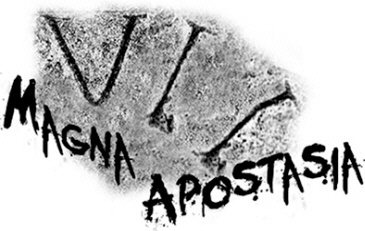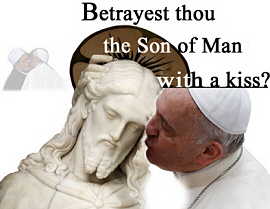|
|
|
“The pluralism and the diversity of religions, color, sex, race and language are willed by God in His wisdom, through which He created human beings,” … “This divine wisdom is the source from which the right to freedom of belief and the freedom to be different derives. Therefore, the fact that people are forced to adhere to a certain religion or culture must be rejected, as too the imposition of a cultural way of life that others do not accept.” |
Two years earlier he had emphasized this
radical insistence on ecumenism through a different tack, the
absolutely clear terms of which by now we are all familiar:
|
“It is not licit that you convince them of your faith; proselytism is the strongest poison against the ecumenical path.” 1 |
Remarkably — and sadly— this is not a new, it is only stated with greater emphasis by Francis, but was also — and for many Traditional Catholics, surprisingly the mind of Benedict XVI:
“The Church does not engage in proselytism. Instead, she grows by ‘attraction.” 2 |
We see that both
Francis and Benedict XVI were Ecumenists (we must remember that
Benedict XVI on October
27, 2011 committed the same folly and in the same venue as his predecessor
John Paul II
in
Assisi 27 Oct 1986)
— and both promoted and taught what is in contradiction
to the Great Commission (St. Matthew 28.16-20), a central
tenet of Catholicism (as well as other Christian denominations),
and the last words Christ spoke to His Apostles before His Ascension:
“Going therefore, teach ye all nations; baptizing them in the name of the Father, and of the Son, and of the Holy Ghost.
Teaching them to observe all things whatsoever I have commanded you.” (St. Matthew 28.19-20)
For Francis, it is not the proclamation of the Gospel and the conversion of souls to Jesus Christ and His Holy Catholic Church that is paramount — rather, it is the heretical program of Ecumenism that is central to Christianity.
To reiterate the point:
Why, then, was it necessary
for Christ to die on the Cross — if “any religion”
suffices to bring man to God, offers salvation, and ultimately
leads men to Heaven?
The answer to this question had apparently been peripheral to
the “Council Fathers” and the answer to it still eludes
the sophistic casuistry of Catholic and Protestant theologians
alike, as it had in their collaborative construction of the
Council and the documents that emerged from it.
At first the heresy of ecumenism was confined to nominally “Christian denominations” — but as the many ineluctable contradictions unfolded, it increasingly and necessarily moved beyond Christianity to encompass all religions — and no religion at all.
Considering his predecessors too timid in implementing the ecumenical venture, he is determined to be the historical champion of unbridled ecumenism, not by introducing something new, but by stridently underscoring, and by every means amplifying, one of the most controversial declarations, and two of the most fundamental tenets of Vatican II: Nostra Aetate 3 on the one hand, which, for example, teaches that Muslims and Christians (oddly) worship the same God; and Unitatis redintegratio, 4 or Decree on Ecumenism, an effort to establish unity between the one Holy Catholic Church and the 45,000 unique Protestant denominations around the world as of this writing 5 — and none of which have entered into unity with the Catholic Church that, for its part, has surrendered so much of its beloved and uniquely Catholic identity in an effort to make it “less offensive” to “the separated brethren” — who, for their ecumenical part have surrendered nothing. Ecumenism, after 70 years, has proven to be a one-way highway to an unfinished bridge ending abruptly, with no guard rail, at the other end.
Let us be as forthright as possible: why — for what possible reason — was it necessary for Jesus Christ to suffer and die on the Cross … if ... if ... there was another way, another religion; if, in fact — as Francis appears to insist — any religion suffices to bring man to God? Is Francis, then, stating something radical and new in this growing post-Catholic Conciliar Church of Vatican II that appears to be repudiating its identity with unprecedented rigor in the papacy of Francis? Not in the least. Francis has always vaunted himself as the one who will bring to its ineluctable conclusion what was only nascent and inceptive in the documents of Vatican II, especially, as we have noted, in Nostra Aetate and Unitatis redintegratio.
Why not, then, any other god or any other religion? There is no indication in these documents, decrees, or declarations of the exclusion of the Trimurti of the Hindus, of Akal Murat of Sikhism, of Elohim of Mormonism, or of Ahura Mazda of Zoroastrianism; nor of Gnosticism, or the self-apotheosis in New Age Spirituality, and so on — or, in fact, no religion at all. for as Francis openly states, “even atheists go to Heaven.” 6
“The ‘god’ of Surprises?”
Absurdity may, in fact, be a prerogative
of Francis’s fabricated “god of surprises” — but
it is not the same God of Abraham, Isaac, and Jacob;
not the God revealed in His Incarnate Son, and certainly not
the God worshipped in the Catholic Church.
If it was not necessary for Christ to die on the Cross
to redeem man from his sins and so open Heaven to men
— then His immolation on Calvary was purely gratuitous — He
suffered and died needlessly — God the Father capriciously and
wantonly crucified His Only-Begotten Son. The Crucifixion was
pointless, and the agony of His Mother of no consequence. This
is the necessary conclusion to the spurious attempt to both
initiate and implement all that is inherently irreconcilable
in the disastrous project of “ecumenism”.
Any other religion would
have been sufficient without Christ and the Cross!
As a postscript I suggest that you not attempt to use
the much abused
“ut unum sint”
(“that they may be one”) citation from Holy Scripture. There
are too many citations to the contrary. Christ was clearly speaking
of His Apostles:
|
“And now I am not in the world, and these are in
the world, and I come to thee. Holy Father, keep
them in Thy |
If you argue that the revelation of God is a gradually evolving and on-going process, a continual “up-dating” of His most holy will so that He, Who created the world, can keep pace with the times and man’s “evolving consciousness”— then Jesus is not the final Word of God after all:
|
“God, after He spoke
long ago to the fathers in the prophets in many
portions and in many ways, |
But we are now to believe that God is going to speak through Francis and abolish this doctrine by revealing that Christianity (Catholicism) is not the only way to the Father despite what Christ Himself said?
|
“I am the way, and the truth, and the life. No man cometh to the Father, but by me.” (Saint John 14.6) |
And if this is not heresy (specifically the heresy of Indifferentism*) then nothing qualifies for the definition.
________________________
2 Benedict XVI at a meeting of Latin American and Caribbean bishops in Aparecida, Brazil, in 2007
5 https://www.gordonconwell.edu/center-for-global-christianity/
*
The belief that all religions ultimately derive from God in different, inconsistent, and contradictory beliefs — even within what is broadly understood as Christianity. Other manifestations of God are held to occur outside of Christianity, and generally come as what are understood as epiphanies or awakenings by and within different individuals, and all of them are equally acceptable to God, capable of bringing their adherents to salvation …generally understood as Heaven or absolute felicity, although this is sometimes simply viewed merely as a state of “enlightenment,” and nothing more) then nothing qualifies for the definition.
Editor
Boston Catholic Journal
Comments? Write us: editor@boston-catholic-journal.com
|
Totally Faithful to
the Sacred Deposit of Faith entrusted
to the Holy See in Rome
“Scio
opera tua ... quia modicum habes virtutem, et servasti
verbum Meum, nec non negasti Nomen Meum”
Copyright © 2004
- 2025 Boston Catholic Journal. All rights reserved.
Unless otherwise stated, permission is granted by
the Boston Catholic Journal for the copying and
distribution of the articles and audio files under
the following conditions: No additions, deletions,
or changes are to be made to the text or audio files
in any way, and the copies may not be sold for a
profit. In the reproduction, in any format of any
image, graphic, text, or audio file, attribution
must be given to the Boston Catholic Journal. |























